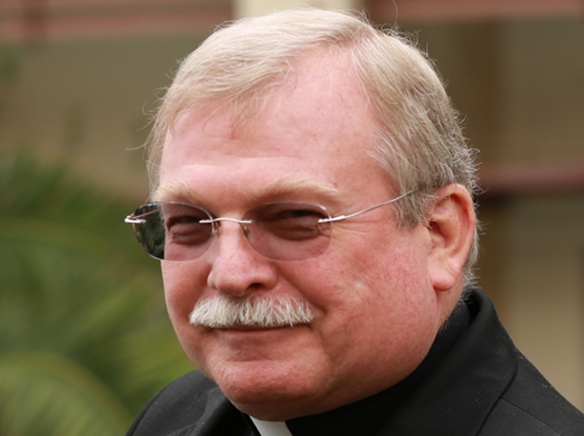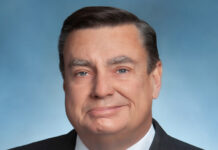Father Bill Schwartz began serving the congregation at Christ the King Episcopal Church in Alpine back in August 2022, very much on a temporary basis at the church on Sundays, as the church was looking for a priest. Over the course of the year, the congregation has asked Schwartz to stay on as the church’s priest, which he said he was happy to do. “We have talked quite a bit about the need to think about the future and to engage with the community,” he said. “Part of this is coming out of COVID. Getting a sense of recovery.” Schwartz said, along with the church’s committee, he is thinking about ways of working with the community and being part of that community, but he said part of that is that he is still learning about the community. Schwartz retired in May 2022 after 50 years of living and working at churches in the Middle East. “Part of what is happening is that I am learning about Alpine, but I am also learning about living in America,” he said. “Learning how people do church here from where I was. Learning about community issues,” adding much of if was simple things like how they do Christmas services, and other holiday services and celebrations. “It is a learning process for us together and all of these things create new traditions,” he said. “We will work at building the church community and also trying to engage with the community as a whole. I am pleased to see that they do different community events. Italian night they did in September. Right before Christmas they had many people come to the church and decorate gingerbread houses. It was a wonderfully joyous community event for children.” “I am pleased to see that there are some strong traditions there but we need to build on that to see what we can do to build the future,” he said. Schwartz spent five years in Egypt, 22 years in Cyprus where he worked and travelled all over the Middle East, moved to Saudi Arabia in 1999 and worked with Christians there for eight years before moving to Qatar in 2007 to build a congregation and a church. “The country there had not had a Christian building since Muhammad’s days and decided in 2005 for churches to be built, so they made a deal with Catholics, the Orthodox, and with us the Anglicans to build a church,” he said. “They told me at my brief … to build a church for all the Protestants, which was quite a challenge. The church we built was big and we had 85 different Protestant groups, different nationalities and languages using the property. We would see 15,000 people on a Friday, which is the Muslim day of worship when they did not have to go to work.” After that, Schwartz went to Bahrain taking over management control, pastoring a church, integrating with the society, and then COVID-19 hit. His retirement date coincided with coming out of the pandemic and the church getting back up on its feet. After all his time in the Middle East, Schwartz said he would not characterize the region as being dangerous as a Christian, but he said he had to be aware and careful. “Most people think the Middle East is a dangerous place, and I would say it is no more dangerous than certain areas of the United States,” he said. “I would not go into downtown areas in big cities in this country unless I knew somebody who knew where and where not to go. One of the issues Christians run into in the Middle East, particularly those who are there with a mission mentality is that they want to convert Muslims. If you are going to do that, you need to be extremely circumspect in your communication. That works against missionaries who have to raise funds and justify their presence with ‘results.’ But my experience with religious interactions and the dynamics lets say between Christians and Muslims, is not from the government, but from the families.” Schwartz said it is because religion, ethnicity, and social interaction are so inextricably intertwined, whereas for those in the United States, religion is just one of the things that people do in their lives. “When you are interacting on that level and in their view enticing someone to forego his heritage, ethnicity, and his family, that is an offensive thing,” he said. Schwartz said it has been a transition from the Middle East to Alpine, but he is adjusting. For now he said he will be the church’s priest of the parish, but it will be on a part-time basis. Schwartz is doing this free, as the church does not have the money to pay him. “But the relationship with the parish is the principle issue for me,” he said. “And that is growing, and moving to something beyond me just showing up for services on Sunday. I am now working with the congregation about their future. When I got here and introduced myself to the local bishop, I said I was going to go to church on Sunday. If I can be useful somewhere, that is great. Now I am moving into something that is more of a time commitment.” Schwartz said he is glad that he did not do this right after his retirement, as he needed the time to readjust and acclimate to the United States again, even with simple things like getting a driver’s license, applying for social security, and integrating into his neighborhood. “I had a million DIY things in the house,” he said. “Now that I have settled and have my feet on the ground, I am in a position to make more of a time commitment to the church. One of the feedbacks I get from people in the church is that the life that I have lived in the Middle East kind of informs my preaching and my understanding of scripture because of how much we interact with scripture mentally is shaped by our cultural realities. We live in a technological culture that is greatly removed from the culture of the Bible. The fact that I have lived within the culture of the Bible, much of it not so much technically shaped, it informs how I approach scripture and explain it. That has been to me, an important aspect.” Schwartz said his professor, also a lifetime missionary in the Middle East, taught him, “Your job in preaching is to rescue truth from familiarity. It is a mantra that I remind myself over and over again,” he said. “We can become too comfortable in the way we have always understood scripture and the way it is reenforced culturally. As Americans we think we have a lot to offer the rest of the world. There is a lot of truth in that, but there is also a lot that we can learn from the rest of the world and our relative isolation works against that. Part of my role is to broaden the context scripturally, theologically, and even culturally.”













